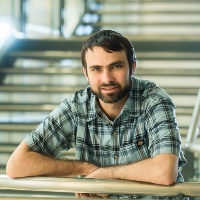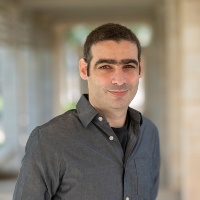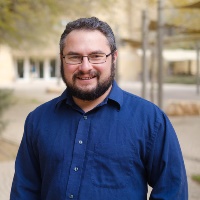The European Union has announced the recipients of its coveted 2020 European Research Council (ERC) Starting Grants, which included three up-and-coming young scientists from Ben-Gurion University of the Negev.
Prof. Raz Jelinek, BGU's VP and Dean of R&D, "The ERC awards to three young faculty members from the Faculties of Natural Sciences and Health Sciences reflect our striving for scientific excellence and the emphasis BGU places on recruiting high quality, leading faculty members."
€677 million in grants were distributed, and the acceptance rate was 13%.
The three BGU recipients are:
Dr. Klim Efremenko

Bio: Dr. Efremenko was born in Kazakhstan and immigrated to Israel when he was 13.
He completed a B.Sc in Mathematics and Computer Science at the Technion - Israel Institute of Technology. He completed a M.Sc at the Weizmann Institute of Science in Computer Science and a PhD at Tel Aviv University, also in Computer Science.
He was a fellow at the Simons Institute, UC Berkeley, a Simons Postdoctoral Researcher at the University of Chicago and a Postdoctoral Researcher at The Institute for Advanced Study at Princeton University.
He was the recipient of a Simons Fellowship at The University of Chicago, and won the Adams Fellowship Award of the Israel Academy of Sciences and Humanities.
Dr. Efremenko is a member of the Department of Computer Science, Faculty of Natural Sciences.
Research proposal:
The area of Error Correcting Codes is about how to make communication and computation in the presence of noise. The area of Error Correcting Codes (ECCs) and Information Theory was established in the late 1940s by Shannon and Hamming. It is hard to overestimate the impact of the theory of error correction: since errors are everywhere, error correcting codes are needed everywhere.
Over the last few decades, error correction has been one of the main enablers of the digital revolution and essentially any modern telecommunications, computing, or data storage system relies on error correcting codes. Beyond their immeasurable practical impact, their mathematical development has also led to profound and deep connections between many fields of mathematics, computer science, engineering, and beyond.
The main question of ECCs is how to transmit a message over a noisy channel so that, despite the noise, the second party will receive the message intact. Despite the fact that most modern communication today is interactive, that is, two or more parties communicate and respond to each other's messages, the coding schemes currently being used were optimized decades ago for one-way transmission of single messages. Thus, there is a need to design better codes for interactive communication.
In the simplest interactive communication setting, two parties, Alice and Bob, are communicating over a noisy channel C. The meta-question here, analogous to the classical coding question, is: What is the "best" way to use C to simulate communication over a noiseless channel?
We ask this question not only for two parties, but also for complex multiparty settings communicating over different channels.
Prof. Idan Hod

Bio: Dr. Hod was born in Petach-Tikva, Israel, and grew up in Kfar-Sirkin.
He completed a B.Sc in Chemistry (major) and Computer Science (minor) at Bar-Ilan University. He also completed his M.Sc and PhD degrees in Chemistry at Bar-Ilan University. Thereafter, he went on to pursue his post-doctoral research at Northwestern University, in Evanston, IL, USA, where he was a Fulbright Fellow.
He has also been awarded the American Chemical Society (ACS) Physical Chemistry Division Postdoctoral Award; VATAT's Alon Fellowship for new faculty members; and the Wolf Foundation's Krill Prize for excellent young faculty members.
Dr. Hod is a member of the Department of Chemistry, Faculty of Natural Sciences.
Research proposal:
Electrocatalytic N2 reduction reaction (NRR) is one of the most promising green alternatives to achieve clean, carbon-free and sustainable NH3 production, solving the globe's future production of food and feed-stock chemicals, and serves as a practical carrier of sustainable energy. Despite the significant progress in this field, NRR electrocatalysts exhibiting both high activity and selectivity do not exist today and novel materials are still much sought after.
Thus, the development of suitable catalytic materials will be a game changer, allowing NRR to fulfil its role in the globe's energy-economy landscape.
Our research aim is to develop a new concept to combine the virtues of both pristine and converted Metal-Organic Framework (MOF) based materials, forming a new strategy to overcome the activity and selectivity limitations of currently-explored NRR electrocatalytic systems. Specifically, we (1) develop new, controllable synthetic pathways for the conversion of MOFs into porous, highly active NRR electrocatalysts, with tuned chemical composition, electronic, and catalytic properties, (2) design pristine MOF-based ion-gating layers to precisely regulate the flux of protons toward the underlying catalytically-active site, and thus suppress the competing HER process and boost NH3 faradaic efficiency, (3) combine the two previous strategies to construct and analyze a full NRR system for simultaneous activity and selectivity enhancement.
This research is highly multidisciplinary, combining materials science, electrocatalysis and photo-electrochemistry. It has the potential to significantly accelerate the development of applications in renewable-energy, e.g. solar cells, light-emitting diodes, heterogeneous catalysts, batteries, water electrolyzers, fuel cells, and sensing devices.
Dr. Benyamin Rosental

Bio: Dr. Benyamin Rosental was born in Kaliningrad in the Former Soviet Union. He and his family immigrated to Israel at the age of 9. He grew up in the southern Arava valley on Kibbutz Ketura outside Eilat. Dr. Rosental is homegrown talent – all three of his degrees are from BGU, from the Faculties of Natural Sciences and Health Sciences.
He completed postdoctoral research at the Stem Cell Institute at Stanford University and at the Hopkins Marine Station. He is a recipient of a Wolf Prize, Rector's Prize, Rothschild Fellowship, Excellence Prize in Bio-Medical Research, Dean's Prize, HFSP, 1st Place awarded for excellent scientific work by the Israeli Immunology Society, and the Yaakov Tal Award.
He is a member of the Shraga Segal Department of Microbiology, Immunology and Genetics, Faculty of Health Sciences. His lab is located at BGU's new Regenerative Medicine and Stem Cell (RMSC) research center.
Research proposal:
Reef corals are the foundation of ecosystems that host much of the ocean's biodiversity, making them a significant component of economies and communities around the world. They are under severe threat from anthropogenic stressors, particularly global warming. Some parts of the world's oceans have already lost the majority of their corals.
Efforts to mitigate the damage are informed by research on understanding and transferring naturally-occurring resilient genotypes. This has a direct parallel in medicine; cell- or gene-therapy, which is founded on an ability to isolate and then transplant progenitor/stem cells. This technology does not exist for any coral species.
In this research program we will develop robust tools for the isolation, characterization, and transplantation of coral progenitor cells. The tools will be species non-specific, and therefore widely applicable.
This technology will have an impact on basic and applied research. Because of the broad applicability, it will become a valuable tool for researchers seeking a more complete cell biology in non-classical invertebrate species. Being able to isolate, manipulate, and replace progenitor cells in diverse species will assist in efforts to understand how the developmental programs that construct or regenerate an organism function and change during evolution. Being able to transfer progenitor cells from a stress-resilient coral to a sensitive one will assist in understanding the mechanisms governing stress tolerance. With this research, and using the tools developed here, it may become possible to confer resilience in the wild.
ERC Starting Grants are awarded to early-career researchers of any nationality with two to seven years of experience since completion of the PhD (or equivalent degree) and a scientific track record demonstrating excellence in research. The research must be conducted in a public or private research organization located in one of the EU Member States or Associated Countries. The funding (maximum €1.5 million per grant, plus up to €0.5 million to cover equipment and/or infrastructures costs) is provided for up to five years.
The European Research Council, set up by the European Union in 2007, is the premiere European funding organisation for excellent frontier research. Every year, it selects and funds the very best, creative researchers of any nationality and age, to run projects based in Europe. The ERC offers four core grant schemes: Starting, Consolidator, Advanced and Synergy Grants. With its additional Proof of Concept grant scheme, the ERC helps grantees to bridge the gap between their pioneering research and early phases of its commercialisation.